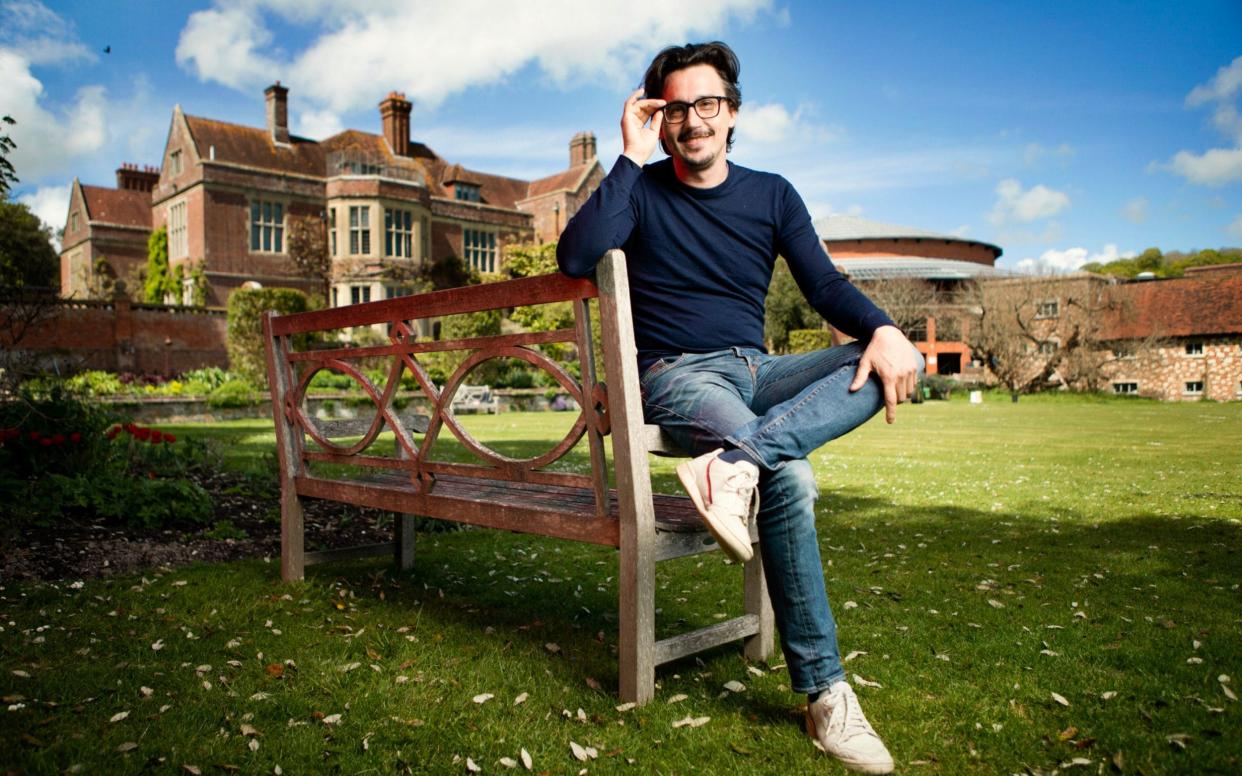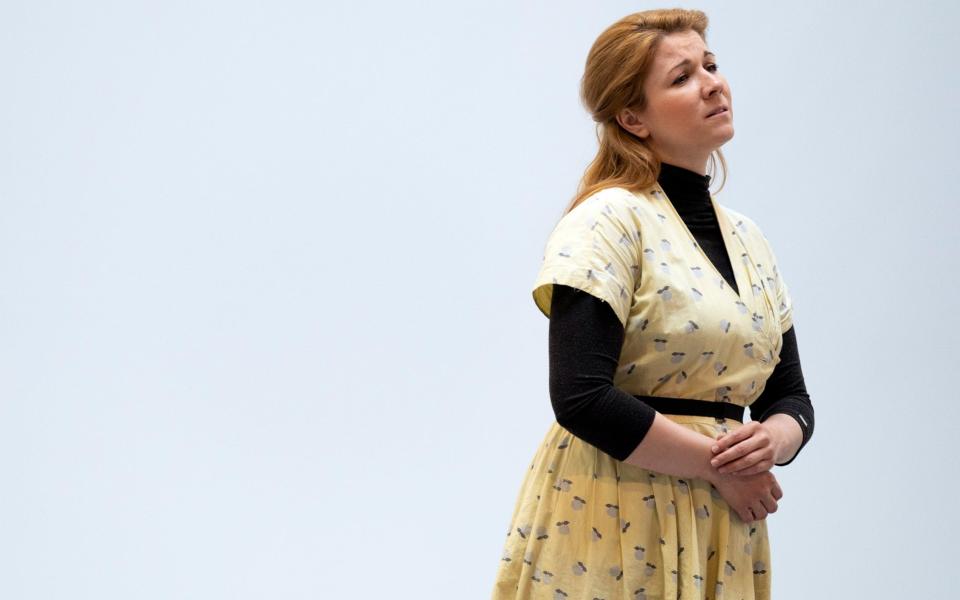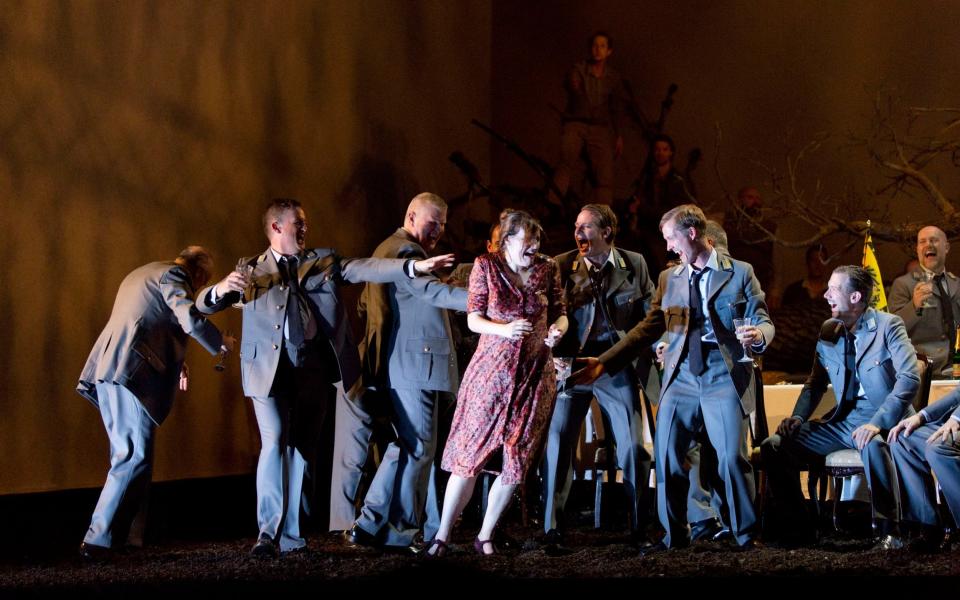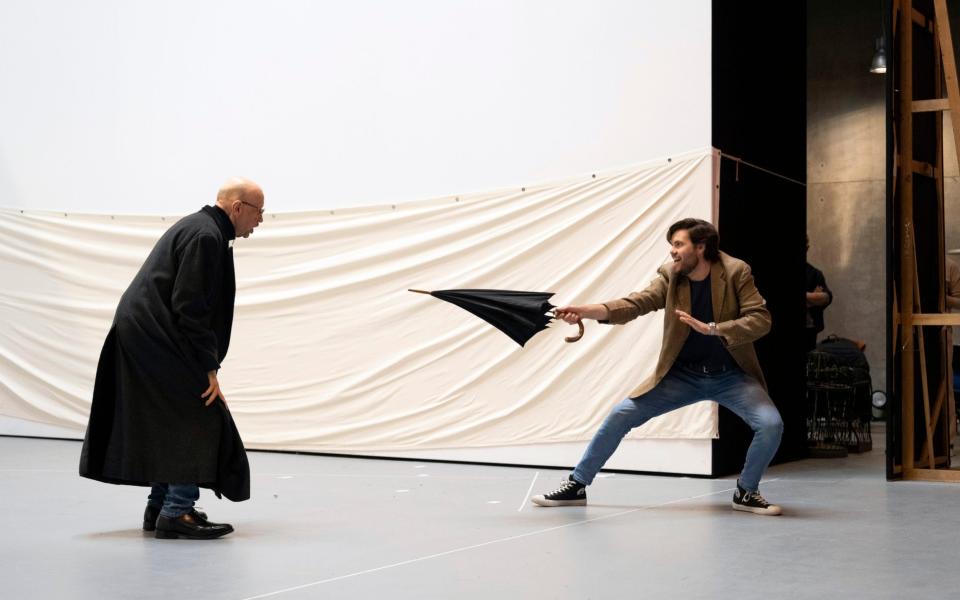Damiano Michieletto: ‘Opera’s not a church, it’s a social event’

- Oops!Something went wrong.Please try again later.
- Oops!Something went wrong.Please try again later.
The beginning of a new season at Glyndebourne this week sounds a note of bright optimism for the arts. On a late morning in May there is a buzz across the sprawling Sussex estate; the sheep take their usual spots in the meadows. And yet for Damiano Michieletto, the director taking on 2021’s first production there – of Janacek’s Katya Kabanova –it’s not all pastoral bliss.
“Honestly, I am a little bit angry,” he starts, two minutes into our interview, a tall, dark 46-year-old Venetian who speaks an idiosyncratic Italo-English. He is irritated that this production must obey social distancing rules, even on-stage, whereas in other industries – for instance filmmaking – this has not been enforced. “Why [do] I have to respect distances [sic], and I’m doing the same job?”
Chafing and indignant, Michieletto seems, at first glance, to be quite happy to back up his reputation as a “bad boy” of opera here in the UK, largely thanks to a controversial rape scene he inserted into his 2015 Royal Opera production of Guillaume Tell, which earned him boos and outraged headlines. It’s reinforced when he flings out decisive pronouncements, such as “I don’t know who the audience is – and I honestly don’t care”. And yet the picture is more complex.
For one thing, what he’s trying to say there, in a slightly quixotic way, is that “the worst thing you can do is to judge the audience, or take them for granted”. In other words, preempt and patronise them. For another, he is also very successful: a year after the Tell furiore, he won an Olivier here for his production of the double bill of Cavalleria Rusticana and Pagliacci, for that same Royal Opera (“They forgave me,” he chuckles.) And he’s a civilised, polite presence. Ask him what his ambitions are for the future, he laughs: “A big musical, a big movie… everything big!”
Michieletto is one of the most in-demand directors across Europe today, but at the moment the Tell furore is still what we know him best for here. In brief, the scene was a pretty radical reimagining of the ballet in Act 3: whereas originally, we see Austrian soldiers force hapless local girls to dance with them, in Michieletto’s version this became a gang rape.
“I’m really happy about the scene,” Michieletto repeats today. “It was a very high quality scene, from my point of view as a director – it was completely meaningful to tell the story of Guillaume Tell.” He says that he has “plenty of explanations and reasons, which for me completely make sense.” For his part, he staged it to spell out the horror of Austrian occupation of Switzerland, the one which Tell is rebelling against; he points out that, in Act I, Rossini has a peasant saying how he has already had to defend his daughter from a soldier. “These military [men] are brutal and crazy – they are actually crazy!”, he says, while the Austrian governor, Gesler, is “really Quentin Tarantino”, not least when he gives Tell that famous ultimatum to shoot the arrow off his son’s head. “It’s really psychopathic! It’s much worse than my rape scene.”
He’s aware the scandal stuck. “I understood later that for the English audience, this was a kind of landmark about myself: ‘oh, Damiano Michieletto is the one who did the infamous rape scene in Covent Garden’”. The ensuing uproar means that it’s the same in America, where he has rarely worked “they have this kind of label [for me] now”. In 2017, the Met actually cancelled staging Michieletto’s new version of Saint-Saens’ Samson et Delilah, apparently on the grounds that it hadn’t premiered well in Paris. So does he think it has limited his opportunities there? No, he says at first, but then, twinkling, “or maybe somebody were a little doubtful [sic]. Maybe they say, okay, let’s wait a bit? But I think Europe offers more than enough work!”
On which note, to Katya. Janacek’s late masterpiece which premiered a hundred years ago this year, is an intriguing, edgy choice for Glyndebourne’s big comeback. The commission dates from the era of the house’s last General Director Sebastian F. Schwarz, who left in 2017.

The tragic story of a young married woman at the mercy of her sadistic mother-in-law, it’s hardly a cheery curtain-opener, but it's gripping stuff. Having seen the first act rehearsed, I don’t think we need expect any great scandal: the production lets the sad story speak for itself. In the stalls, Michieletto watches intently; on a break, he bounds onto the stage and tells his Katya, Czech soprano Katerina Knezikova, how to run onto the stage at just the right level of disarray.
Michieletto is doing this opera because he loves Janacek, he says, how this opera “is so simple and dramatic, and full of tension and conflict”. Janacek writes the libretto as beautifully as the music, which is a rare gift in opera, he chuckles – “I always say, I hate when a composer writes the libretto – I hate that!”
Michieletto grew up just outside Venice (he still lives there now, with his wife and two teenage children), from a working-class background. He got into opera-directing via studying theatre, gaining a degree in direction from the prestigious Paolo Grassi school in Milan; he was still ambivalent when he got his first professional opera directing gig at Wexford Festival in 2003. “After that I said to myself, yes, it’s an interesting language, and it’s not for old people. It’s not dead – it’s actually very emotional.”

It was at Wexford that Schwarz first saw Michieletto’s work – “I loved it,” says the Austrian, now in charge of the Theatre Royal of Turin. Although he left three years ago, opera is planned sufficiently far ahead that it will be largely Schwarz's programming which we will see at Glyndebourne in 2021, 2022 and indeed even 2023, and within it the names of a clutch of top European directors of which Schwarz is a particular fan, such as Christoph Loy who this year gives his Luisa Miller, and Mariame Clément who brings some lighter relief with Rossini’s Un turco in Italia.
Michieletto himself is so good, explains Schwarz, “because he works in-depth with his artists, carving out the characters, which in Italy is still rare – somebody who works in this psychological way.”
Schwarz says Michieletto “finds ‘today’ in works that date back centuries”, be it a Madame Butterfly set in modern-day Tokyo which repositions Cio-Cio San as a victim of callous sex tourism, or a Suor Angelica inspired by the scandal of Ireland’s Magdalene Sisters.

Despite his contracts being cancelled at the start of coronavirus Michieletto sees the challenge for the future not in overcoming the virus but in how you keep connecting with a younger audience. “My position is that for a living show [sic], theatre, opera, concert, dance, if you don’t create a dialogue with the digital world, you will be out,” he says. His kids are a case in point. His youngest, in particular, is bewildered that this Katya production won’t be available online. “He was like, ‘what? Come on! It’s just for the people who go there?’ I saw in his eyes, like: ‘This is really old.’”
All of which makes me wonder what he thinks of Glyndebourne and its rituals. Does he like the dressing up? “I like the big break in the middle,” he beams, meaning the long, often champagne-sodden picnic interval. “Because I think basically that’s what theatre is – theatre is not a church.” Many of the golden ages of theatre, be it in Ancient Greece or Shakespeare’s day or Baroque opera, weren’t the hushed, dark temples we think of today, he tuts. “This is a social event.” Although to be clear, it’s still the stuff on stage - his work - that is the point of it. “Theatre, if it’s well made, won’t die,” he shrugs confidently. “It’ll only die if it’s badly made.”
Katya Kabanova opens on Thursday. Tickets: glyndebourne.com; (0)1273 812-321

